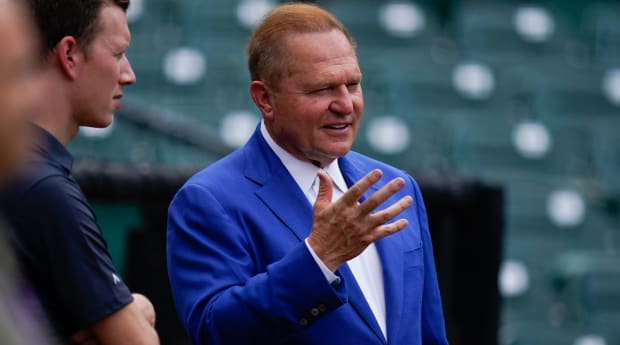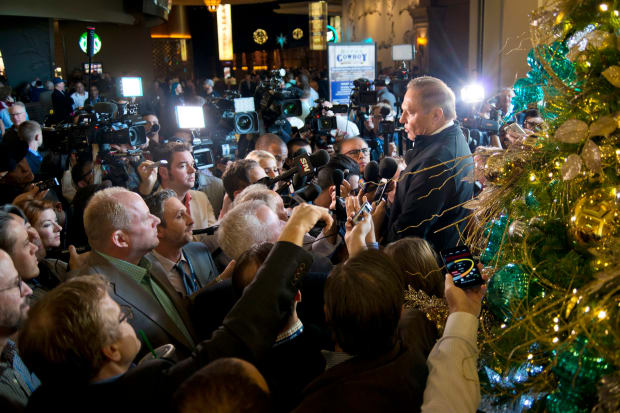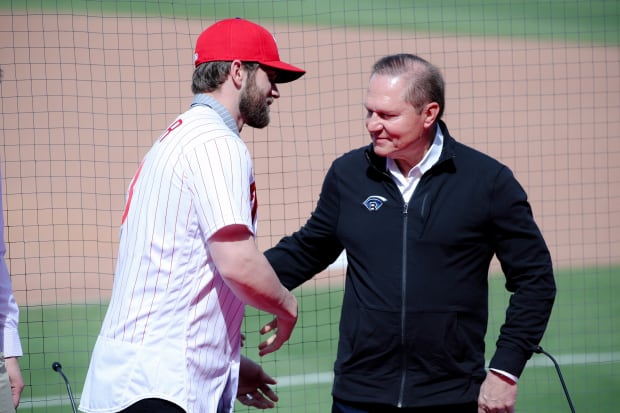How Scott Boras, the biggest agent in baseball, turns meetings with reporters into a semiannual sea of puns, metaphors and jokes.
As the 2022 season wound down, Carlos Correa addressed the media in the Twins’ clubhouse. The star shortstop had signed a three-year, $105 million deal with an opt-out after the first season, and reporters wanted to know what Minnesota could do to convince him to stick around.
“I go to the mall, and I go to the Dior store and I want something, I get it,” Correa said. “I ask how much it costs and I buy it. So if you really want something, you just go get it. I’m the product here, and if they want my product, they’ve gotta come get it.”
Across the country, Correa’s agent, Scott Boras, watched the video and all but rubbed his hands in glee. Forty-one days later, he too addressed the media, this time in a lobby outside a ballroom at the Conrad hotel in Las Vegas.
Asked about Correa, who had decided to opt out, Boras said, “When you're a franchise player and you've known it for years, you have a ring on your finger, you’ve been a multiple All-Star, you have all these things, you're a franchise brand. You're kind of the Dior of defense. You’re the Hermès of hitting. You're the Louis V of leadership. You're the Prada of the postseason. It's a one-stop shop for a championship designer.”
Boras’s press conferences—one at the general managers’ meetings in November, another at the winter meetings in December, each about an hour of hyperbole and wordplay—have become a tradition, as have the reaction they receive: reporters alternating between groans and laughter.
Over the past decade, the whole affair has become somewhat interactive, with reporters calling it the State of the Boras and taking bets on references he will make. (We foresaw Dior but not a later foray into geopolitics.) We egg him on—and also offer criticism. After one particularly tortured series of Kris Bryant–as–Sean Connery puns that included, “He’s always red hot in the hunt for October, an extraordinary gentleman and in a league of his own,” last November, I could not stifle an aggrieved, “Scott!” He grinned and moved on to describing Michael Conforto as “the King of Queens.”
This year, after a series of references to Wagyu and filet followed by a detour into fashion and art, Evan Grant of the Dallas Morning News gently prodded him, “I’m hoping to get back to the meat theme.”
But Boras cannot be redirected. He answered quickly and then, barely concealing his glee, asserted that “Taijuan [Walker] is on an island, and the only question is, ‘Who is willing … Taipei?’” After that one, James Wagner of The New York Times asked simply, “How do you keep a straight face?” Boras replied, “Well, it’s a very serious moment.” He later added, of center fielder Brandon Nimmo, “There are a lot of teams in the free-agent market that are in the market for a center fielder, and whoever … Pixar … guy will be the lucky one to finding Nimmo.”
Some journalists have asked for previews of his material; I myself have been begging for years to be let into the writers’ room. Boras declines to let me in or to give me access to his employees, saying, “I don’t want to subject my staff to this.” But he has agreed to give me some insight into the process.

Tommy Gilligan/USA TODAY Sports
Initially, he says, his media availabilities were intended to make lives easier—both ours and his. He says he used to be inundated with calls from journalists while he was trying to meet with teams, and, because Boras is one of the few major agents who actually seems to enjoy talking on the record, he decided to set aside a few hours and meet with us all at once. (He does not mention the benefits of added press for his clients.) But the sessions didn’t turn into open-mike night until about a decade ago.
Legend has it the whole thing started at the 2010 winter meetings, when the Nationals signed outfielder Jayson Werth to a seven-year, $126 million deal. Then Mets GM Sandy Alderson quipped, “Makes some of our contracts look pretty good. That’s a long time and a lot of money. I thought they were trying to reduce the deficit in Washington.”
Boras—though he did not appreciate the comment—did appreciate the use of humor to generate coverage. (We as reporters would probably not write, “Scott Boras says Taijuan Walker deserves a big contract,” but seemingly every person in the room tweeted the Taipei line at the time.)
In 2011, Boras told reporters of the Dodgers and the Mets, “Normally, they’re in the steaks section, and I found them in the fruits-and-nuts category a lot.” A year later, he said the Mets, who had made no major acquisitions, were “in the freezer section,” while the Dodgers, who had bid $25.7 million for the right to negotiate with Boras client Hyun Jin Ryu, “bought the store.” Told of this, Alderson said, “Freezer burn is something I’m familiar with.”
In 2014, Boras placed the Mets in “the ready-food section.” Alderson fired back, “Boras has been shopping near the meat section. That’s where he gets his bulls---.”
Reached now to atone for his part in all this, Alderson says, laughing, “I’m not issuing [an apology].” He adds, “We’ve exchanged things over the years. I have a lot of respect for Scott, and I only engaged to humor myself and to humor the writers.”
Regardless of whose fault this is, it keeps happening. “We're trying to bring humor to you poor writers who are sitting down for 72 hours with nothing to write,” Boras says, generously.
So he convenes another group of writers: his Boras Corporation employees. People jot down thoughts all year, but the rule is that they are supposed to keep their ideas to themselves until the World Series ends. He sends out an email, and a dozen or so of them gather to hone the jokes. “These guys work 18 hours a day,” he says. “[This] creates great levity.” He says he enjoys the chance to learn about the members of his staff—one woman in particular, he says, has MIT training but an unexpected “personality type that is almost Dr. Seuss.”
He clarifies that he does not write most of the best lines. “Ninety-five percent of the things I bring, they’ll throw paper at me,” he says. “‘This is terrible! Get out of here!’”
His staff, worried he will run out of material, asks him to delay the session until the winter meetings, but he likes the idea of kicking off free agency, so he splits up his act: The GM meetings are about his clients, and the winter meetings are about the teams.

Daniel Clark/USA TODAY Sports
A day or so after the event starts, one of his employees texts reporters with a time and location. (At 9:45 a.m. local time Tuesday, the text went out that this year’s State of the Boras would be held less than two hours later—and immediately after commissioner Rob Manfred finished his press conference—at 11:30 a.m.) The staff stakes out a good spot—either somewhere grand, as in the case of the 2018 winter meetings in Las Vegas when Boras positioned himself in front of a 25-foot-tall Christmas tree, or somewhere convenient, as in November, when he spoke a few feet from the media workroom—and sets up a makeshift dais, usually of wooden boxes or hard-sided suitcases. Reporters gather 10 deep. Boras arrives clad in a Boras Corp. quarter-zip, tight jeans and dress shoes that surely cost as much as one of Correa’s typical Dior purchases. He usually holds a folder containing handwritten notes. (This year’s, for some reason, was labeled MICHAEL CONFORTO.) He begins with an opening statement, usually about the playoff structure or the draft or some other overarching theme that often actually makes a pretty good point.
Then he takes questions.
“Funny you should ask,” he says, beaming as a writer mentions one of his clients, or, “I would love to answer that.” And sometimes he answers questions no one has asked at all. He volunteered a series of lines in 2018: The Blue Jays were suffering from “the Blue Flu.” The crowds at Marlins Park “put the M-I-A in Miami.” And in Minnesota, “sometimes only one of the Twins shows up.”
The winter meetings tend to involve outrageous, incomprehensible, extended analogies. In 2019, Boras was captivated by the avian scenery on his drive down from Orange County to San Diego. Asked about the Mets, who were in the process of being sold to Steve Cohen, Boras said, “There are sparrows who have a desire to get something big but can’t carry the weight of it. There are some owls, who are wise. You certainly have a lot of hawks this year. Probably the biggest concern is you don’t want to be an ostrich and lay the biggest egg. The Mets right now are birds of a different feather.” (“What did he mean?” wrote Tyler Kepner of The New York Times. “Who knows?”)
The GM meetings are all about wordplay. Perhaps Boras’s most famous one centered on star right fielder Bryce Harper, who signed in 2019 with the Phillies for 13 years and $330 million. Boras declared his free agency “Harper’s Bazaar” (his daughter’s idea).
He reveals now that the public was barely spared from an unspeakable horror: He was at first committed to a harp metaphor instead, and even got one in at Harper’s introductory press conference. (“You could clearly see the maestro wanted to build the championship symphony—‘I want the Harp,’” he said. “And the Philly Harp–monic was built.”) But he entered the brainstorming session having just learned that harps have 47 strings. He was partway through the 47 ways Harper could improve a team when he stopped—his own team was drowning him out with boos.
“Harper’s Bazaar” was much better. “It’s always simple,” he says, adding, “[A’s president] Billy Beane called me on the phone and goes, ‘That was awesome!’”

Kim Klement/USA TODAY Sports
Boras receives a lot of feedback from teams, much of it begrudging. A few executives have even suggested their own lines, which he ignores. Many of them have asked for a preview. “No,” he says now. “You gotta come to the event. It’s like Christmas morning.”
He insists he just learned the term “dad joke,” and that it does not apply to what he does. These are corny jokes. “We try to make it as corny as possible, because that’s what the writers enjoy,” he says. “We understand that a lot of people on the outside won’t relate to it. It's not designed for that. My hope is if I can get you and everybody else around to snicker or crack up or roll your eyes, that we've achieved our objective.” (He describes, in mock indignation, an interview on MLB Network Radio with a professional comedian who panned his set. “That would be like inviting a comedian to spring training and saying, ‘Hey, make the team!’” he says.)
He mostly succeeds, although I admit that I was briefly disappointed in him at the GM meetings. He missed an obvious chance late when a writer asked about White Sox righty Dylan Cease’s interest in signing an extension, saying simply that they would listen to offers instead of incorporating the word desist.
Boras defends himself by explaining that Cease has three years of club control remaining and was therefore not on his list. Besides, he likes to prep the players whose names he will use, and in this case what came to mind was too inflammatory to use without approval: He will cease to be a White Sox if they don’t make a good offer. “Way too bold!” he says now. “Way too hard on the accelerator.”
Still, he can barely contain himself as he looks forward to November 2026, when Cease is scheduled to hit the open market. His last name, sure, but also his first! Boras mentally scrolls through Bob Dylan’s discography, then cackles. “He’s really a great name,” he says gleefully. “We can’t wait for his free agency.” Neither, I’m sorry to say, can we.